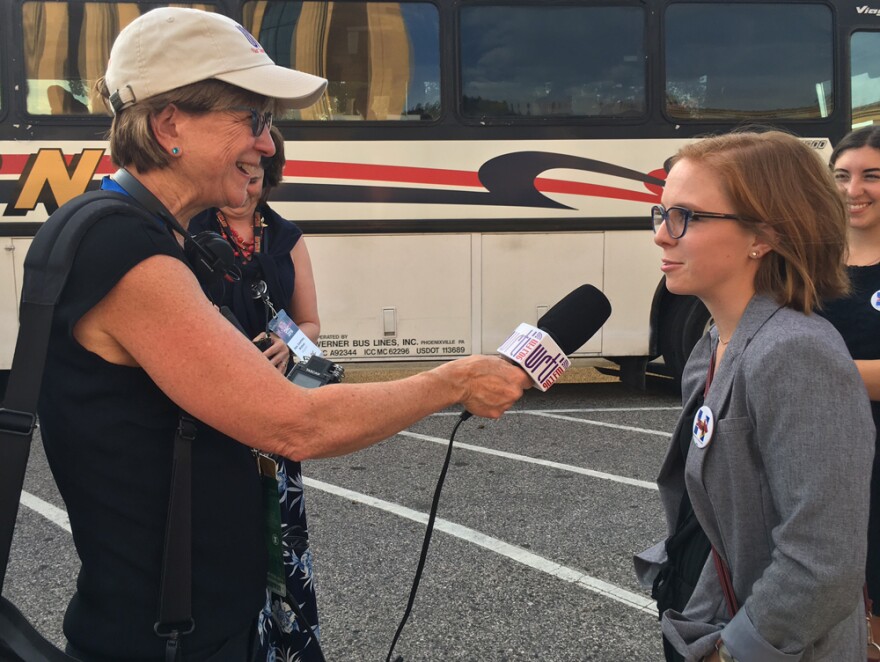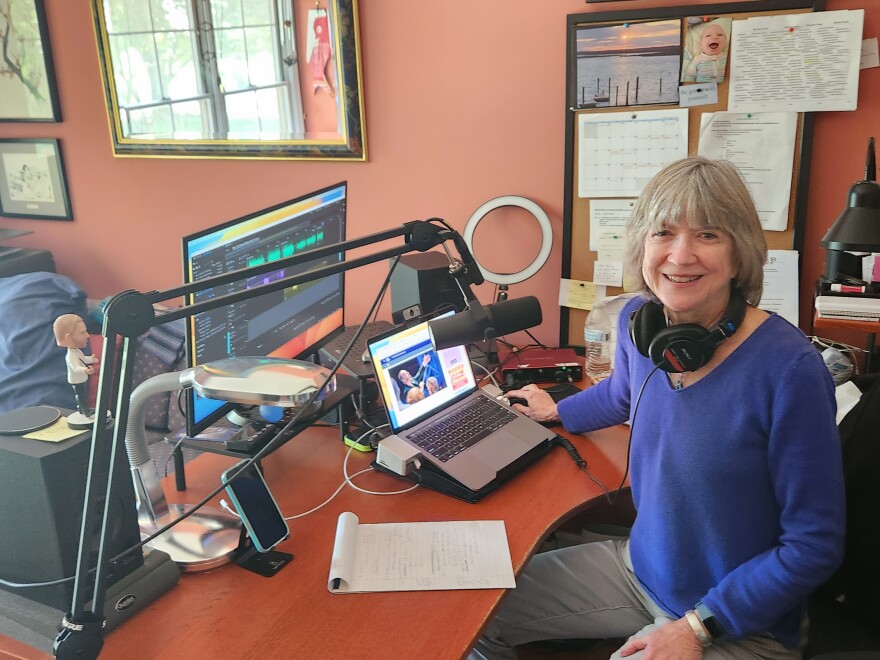Susan Lewis, who joined WRTI in 2005, has interviewed hundreds of artists, written countless articles, and assumed an array of other responsibilities at the station. On her last day with us, she looks back on the past 18 years with a parting love letter (below) — and a reflection on the many stories she has brought to light.
"Susan has produced a tremendous body of work that has fueled innumerable listeners' love and passion for the arts," says WRTI General Manager Bill Johnson. "We've been lucky to have her as a colleague and I can't think of a more dedicated advocate for WRTI's mission and role in our community."
Please join us in thanking Susan for her service to WRTI in the Comments section at the bottom of this post.
Dear WRTI,
You’ve given me a lot to think about.
A day in mid-October, 2007:
Trying not to look down, I’m balancing precariously, my feet edging along plywood scaffolding that wraps around at the very top of the sculpture of William Penn atop Philadelphia’s massive City Hall, 157 feet above the streets of center city. My left hand clutches an expensive digital recorder and my right grasps a long microphone; I hope the wind sock on its end will filter out the whooshing sound of the gusts that are ruffling my hair way up here where birds are circling.

But then I realize there might be a more secure place to stand: The top of Penn’s hat opens like a hatch on a submarine! I drop a foot into the darkness, feeling my way down the ladder until I am waist deep in the giant head. Okay! Yes, this is a much better place to do an interview with David Cann — the man tasked with cleaning Alexander Milne Calder’s iconic sculpture.
Okay, so this is not what I pictured when I signed up to work at Philadelphia’s classical music and jazz station. But it illustrates a leitmotif that has woven itself throughout my tenure at WRTI: a recurring theme of unexpected and surprisingly delightful opportunities, taking me out of my comfort zone, prompting me to learn new skills and perspectives, as I meet creative people and share their stories.
When I walked in the door of WRTI in 2005 from a career in law and journalism, I was a “print person” — a writer of words on a page. I liked listening to the radio, but I’d never built one in my basement growing up; I didn’t DJ from the time I was 15 (the way a surprising number of my new colleagues had); and the large board of lights where the host sits in the studio made me think of the cockpit of a jet plane, where pressing the wrong button or moving the wrong lever could have disastrous consequences.
My foray into radio was a jump into the deep end of WRTI — a rapidly changing ecosystem in a changing world, full of enthusiastic and talented people honoring tradition and innovation, keeping pace with technology and staying committed to the human side of our mission to champion art and music as a cultural resource. We’ve said in our member drives that WRTI connects music makers with music lovers.

It’s been an honor to be part of that connecting process.
Classical music and jazz are the lifeblood of so many who have found joy and even salvation in the music, yet both forms can be intimidating to the uninitiated. I’ve had the privilege of talking with hundreds of incredibly talented artists — and the freedom to ask some seemingly dumb questions.

Whether in the studio, or out in the field, WRTI has given me a wild variety of responsibilities and opportunities that have taught me to be prepared but think on my feet, learn and grow as the world keeps changing. From interviewing musicians and artists from Philadelphia’s rich cultural community and around the world, to producing audio and video features for Arts Desk, from anchoring the news (conquering that scary board of lights!) to doing on-air fundraising; from hosting live musical performances in the community and in WRTI's Performance studio to covering the Democratic National Convention, discovering what music means to people in communities all over the country.
Then came 2020, when the seemingly impossible happened, and live music venues shut down around the world. We began working remotely; WRTI allowed me to start a video series called TIME IN, where I connected with artists about their lives and hopes for the future.

Finally, the work I’ve done with people of The Philadelphia Orchestra has been a joy. I listened to weekly rehearsals before heading backstage for interviews, and went on tour with the Orchestra to Europe and China. I produced stories about musicians’ individual activities in the community, and in recent years, produced and conducted interviews for The Philadelphia Orchestra in Concert. In this role, working both in person and virtually, I’ve interviewed people from all over the world, including South African soprano Pretty Yende, who discovered opera by accident when, as a high school student headed for a career in accounting, she heard a British airways TV commercial scored with an operatic duet; 95-year-old Swedish conductor Herbert Blomstedt, who fell in love with classical music as a seven-year-old listening to the radio from the woodlands in Sweden; and composer Iman Habibi, who grew up in Iran and now writes music fueled by his passion to protect the environment.
Stories so human and so transformative.
Philadelphia Orchestra music director Yannick Nézet-Séguin has shared his insights about the great masterworks and new pieces he conducts with the Orchestra; about how an orchestral program can foster cross-cultural understanding, and about how the power of music extends beyond our human community.
Yannick loves his cats, and has music in his house all the time. “For me,” he says, “It’s a given that cats like classical music.” And so, when the opportunity arose, it was only natural for Yannick to create a music playlist for animals awaiting adoption.
“I quite easily selected some pieces because they are what my cats prefer,” he says, before going on to explain some of his selections — Wagner's opera Parsifal, some Debussy piano music, some Bruckner symphonies, Mozart's The Marriage of Figaro.
[Check out highlights from more of Susan's interviews here.]
Seriously, how could I not love this job? And how could I not leave it feeling changed for the better?
I’ve learned that when you talk about art and music you end up talking about life. Thank you, WRTI; it’s been a blast. On to the next adventure!
Love,
Susan


